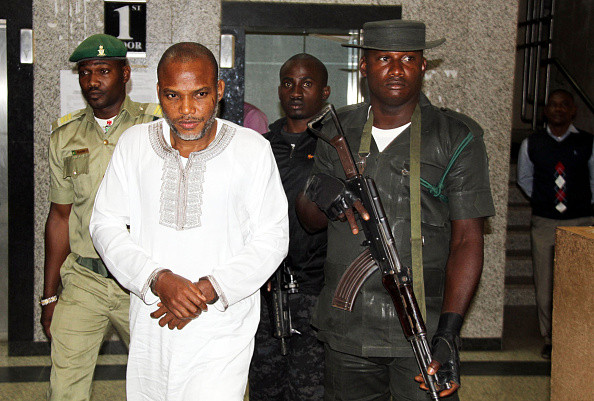Disturbing video allegedly shows Nigerian army torture and murder Biafran secessionists
Video appears to show soldiers beating men with batons and forcing them to drink dirty river water.
The Nigerian army is investigating a video showing what appear to be troops torturing and murdering civilians accused of belonging to a separatist group.
The nearly three-minute-long video began circulating on social media earlier in September. It appears to show soldiers forcing a group of half-naked men to lie down on the ground, beating them with batons. They are then forced to lie in a river and drink dirty water.
Pointing at what appears to be a corpse lying on the ground, the person recording the video is heard saying: "This one now, is dead".
The footage ends with images of the men lying in the water motionless. It is not clear what happened to them next and whether they are dead or alive.
The men were suspected of belonging to the Indigenous People of Biafra (Ipob) group, which calls for the independence of Biafran territories that were forcibly annexed to Nigeria during British colonisation. An Independent Republic of Biafra was declared in 1967 and re-annexed to Nigeria in 1970, after three years of civil war.
It is believed the footage was taken in Abia state, in Nigeria's south-east. IBTimes UK sources said the men were travelling to the residence of their leader, Nnamdi Kanu, when they were stopped by the military. Soldiers found the youths in possession of flags of the former Republic of Biafra.
The army's spokesperson, Brigadier General Sanni Usman, was not immediately available for a comment on the video.
However, he was quoted by local media as saying the army was aware of the footage and was investigating it.
"We are aware of certain video being circulated," he said, according to the Daily Post.
"We have gotten complaints of the said video, and have commenced an investigation into the matter and the report would be made public. The General Officer Commanding 82 Division, Major General Adamu Abubakar, is investigating it and whatever it is, we will definitely let the public know about the outcome."
Rights group Amnesty International told IBTimes UK it is also investigating the video.
Allegations of violence
This is not the first time that Nigerian security forces have been accused of violence against of pro-Biafra secessionist groups, but authorities have always denied such allegations.
In March, Amnesty called on the governor of Anambra state in south-eastern Nigeria to investigate alleged killings of pro-Biafra secessionists that have occurred in recent years.

Amnesty released reports alleging abuses against Ipob members, claiming security forces had killed at least 150 people "and injured hundreds more during peaceful assemblies" since August 2015.
The army denied the allegations, claiming it intervened to prevent "ethnic clashes" and accused Amnesty of trying to tarnish its image.
Independence calls have gained renewed momentum following Nnamdi Kanu's arrest in October 2015. Kanu, Ipob leader and director of UK-based Radio Biafra, is standing trial on treasonable felony charges and was released on bail earlier this year. The trial will resume in October.
The Nigerian government has always maintained the country's unity was a priority and that while peaceful pro-Biafran protests were welcome, demanding the breakaway of the Biafran territories went against the constitution.
Security analyst David Otto believes that, should investigations confirm that the men in the video were tortured by soldiers, it will be a strong sign that excessive violence might lead to radicalisation of youths, subjected to such treatments.
"The security services shown in this vile video have shown ineptitude in handling the Biafra agitators to a point where their action is acting as a radicalising tool to vulnerable and angry Igbo youths , creating the basis of ethnic and sectarian violence in Nigeria," he told IBTimes UK.
The majority of people inhabiting south-eastern Nigeria are Igbo, one of the country's largest ethnic groups. The Igbo people led the 1967 Biafran secession.
"The security forces must be called to order and the President [Muhammadu Buhari] has to intervene and address the Biafra agitation crisis in the south," said Otto.
"This is enough evidence that there is the urgent need of restructuring the security services training to take into account cruel actions that generate unintended consequences that may jeopardise national peace and stability."

Nigeria up close: Check out our Flipboard magazine
© Copyright IBTimes 2024. All rights reserved.







